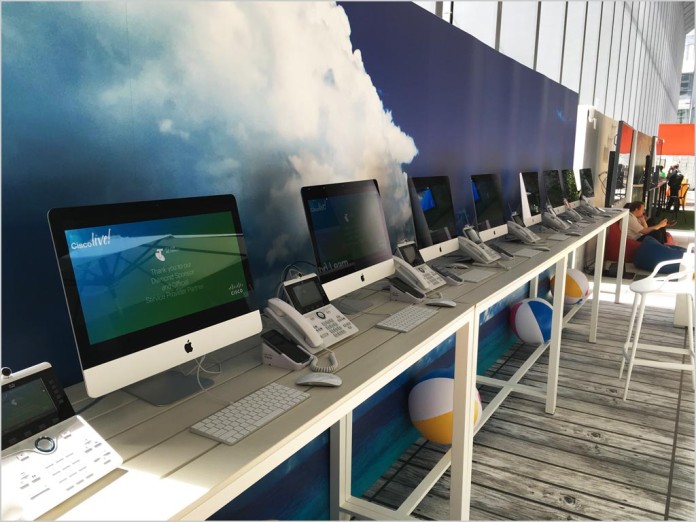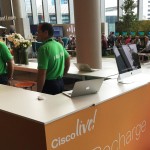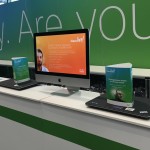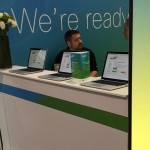
blog Walking around Cisco Live in Melbourne over the past several days, it is quite hard to escape the fact that Cisco appears a little more … obsessed with Apple iMacs and MacBooks than one would expect. While there are Windows machines to be found, almost all of the machines used at the conference by attendees for various tasks such as registering, participating in Cisco’s certification program or even just casually web browsing are Apple units.
It also appears that a large percentage of attendees were also carrying MacBooks of one variety or another. I’m no exception … I’m working this week on a MacBook Air.
All of this surprised me; usually more technical people in the form of IT professionals tend to use Windows, and I would expect it to be the same inside a major vendor such as Cisco. Then too, it’s usually easier to manage vast fleets of Windows devices than Apple gear — Apple’s Macs have historically been more aimed at individuals than at mass rollouts for corporations, with Windows normally winning the manageability crown.
But it may be the case that the worm has turned recently in terms of how major corporations view Apple, or that Cisco just believes Apple devices are seen as more ‘premium’, and thus better suited to display its technical credentials as a major vendor at its annual conference.
In any case, the mass Apple display was a little surprising to me, and I’m sure others. It would be interesting to know why Cupertino got the nod here.




Are you sure those demo and display units were not actually provided by apple (ie for free or near enough) to Cisco as a means of marketing apple products?
Also the other workstation vendors are all direct Cisco competitors – HP (even with the split), Dell, Lenovo etc. Apple is one of the few companies with which Cisco doesn’t compete except in the most indirect sense.
that pretty well makes a lot of sense for the shift then. Denying competitors a not insignificant amount of $ is probably worth the extra they have to pay due to apple tax ;)
I know a hell of a lot of Techo’s that use Mac’s these days, some dual boot windows just because the quality of the HW is so much better but most are hardcore Linux users and OSX feels like a a pretty Linux distro to them.
FWIW, Even tho i’m not in a Techo role these days, at home I have 2 Mac’s (2012 i7 Mini, 2013 rMBP), 2 Linux Servers, a Windows 7 Netbook and a Windows 2008 File Server. The Mac’s are our go to Workstations but i’m now rather fond of Linux Mint and just migrated to it for our Plex media Server this week.
The entire non-corporate dev world has gone all in on OSX. Go to to any programmer meetup, conference or coworking space, and it’s 99% mac books. A lot of tools (esp in e.g.rhe ruby world) specifically target Macs.
Its been this way for several years now.
You’ve been spending too much time around govt types ;-)
The majority of Cisco employees I deal with day to day are mac users, and even in one of the tech sessions on Tuesday there was some ribbing as one of the 4 running the session was still a windows user.
I suspect that for quite a while “technical people” have been taking the follow-the-leader Windows at work and Macs at home.
Now more are emboldened to come out with their little secrets.
Interesting, in the breakout sessions I’ve been attending, a lot of attendees, like me, are using MS Surface devices.
IMO, it’s because finally the whole Apple/Microsoft war is petering out. Because of the movement toward application and OS virtualisation, mainstream is waking up to knowledge that the OS that the endpoint runs on means less and less, even from an IT management perspective.
At Microsoft meets you are seeing a healthy percentage of OSX and Linux distros these days. And the Microsoft people don’t even blink at non-Windows platforms.
These days in Microsoft, it’s all about Bing, Hyper-V and Azure. Windows still has it’s place, but now that there’s mature abstraction layers at the OS/Hardware (Cloud resources like Azure/Amazon, and hypervisors like ESX/XenServer/Hyper-V, even Bootcamp), and OS/Application level (ThinApp, XenApp, App-V) any Windows/Linux app or desktop can work on any endpoint if it can’t run natively. And if you are locked in by your OSX platform, you can run all your windows apps there anyway via a virtualised Windows app platform (VDI or App Virtualisation).
OS’s will have their place for the immediate future (although see Amazon for Lambda which might upset things down the track). There’s quite a bit of upheaval at the moment, but it’s fascinating to watch.
In addition to many other interesting points raised in the comments here, it could also be a matter of physical labour set up time. Setting up an iMac with two cords (assuming they’re using ethernet) is much less labour intensive, and much neater, than trying to set up a more traditional-style PC.
I’m sure it was a mixture of factors and not one single point which drove the decision to run Macs.
Comments are closed.